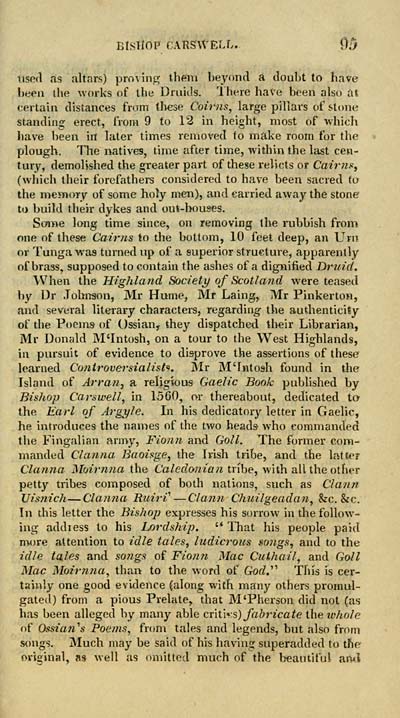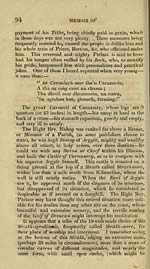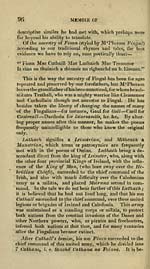Download files
Complete book:
Individual page:
Thumbnail gallery: Grid view | List view

EISHOP CARSWELL. *l.7
uspfl as altars) proving them beyoncl a doubt to have
been ihe \vorks of the Druids. Ìhere have been also at
certain distances fram tbese Coirns, large pillars of sttme
stancling erect, from 9 to 12 in height, most of which
have been iri later times removed to make room for the
plough. The natives, time after time, within the last cen-
tury, demolished the greater part of these relicts or Cairns^
(vvhich their forefathers considered to have been sacred fo
the meìTFtory of some hoìy men), and carried away the stone
to build their dykes and out-bouses.
Scnne long time since, on removing ihe rubbish from
one of these Cairtis to the bottom, 10 feet deep, an Urn
or Tunga was turned up of a superior structure, apparenlly
of brass, supposed to contain the ashes of a dignified Druid.
When the Highlaìid Society of Scotland were teased
t)y \)v Johnson, Mr Hume, Mr Laing, Mr Pinkerton,
and several literary characters, regarding the authenticity
of the Poems of Ussiauy they dispatched their Librarian,
Mr Uonald M'Intosh, on a tour to the West Highlands,
in pursuit of evidence to di&prove the assertions of these
learned Coniroversialist^. ÌMr M'Intosh found in the
Island of Arran, a religious Gaelic Book published by
Bishop Carswell, in 1560, or thereabout, dedicated to
the Earl of Argyle. Li his dedicatnry letter in Gaelic,
he introduces the names of the two heads vvho eomnianded
tlie Fingalian army, Fionn and Goll. The former com-
manded Clanna Baoisge, the Irish tribe, and the latler
Clanna Moirnna the Caledonian tribe, with alltheother
petty tribes composed of both nations, such as Clafin
Uisnich — Clanna Ruiri'' — Clann Chuilgeadan, &c. &c.
In this letter the Bishop expresses his sorrow in the foUow-
ing addiess to his Lordship. '* That his people paid
rrvore altention to idle tales, ludicrous S07igs, and to the
idle tales and songs of Fionn Mac Cuihail, and Goll
Mac Moirnna, than to the word of God.''' This is cer-
tainly one good evidence (along with many others promul-
gated) from a pious Prelate, that M'Pherson did not (as
has been alleged by many able crìtWs) fabricate thetvhole
of Ossian''s Poems, from tales and legends, but also from
songs. Much may be said of his having superadded to tfie
(^risinal, as well as omitted niuch of the Ijeautiful an-d
uspfl as altars) proving them beyoncl a doubt to have
been ihe \vorks of the Druids. Ìhere have been also at
certain distances fram tbese Coirns, large pillars of sttme
stancling erect, from 9 to 12 in height, most of which
have been iri later times removed to make room for the
plough. The natives, time after time, within the last cen-
tury, demolished the greater part of these relicts or Cairns^
(vvhich their forefathers considered to have been sacred fo
the meìTFtory of some hoìy men), and carried away the stone
to build their dykes and out-bouses.
Scnne long time since, on removing ihe rubbish from
one of these Cairtis to the bottom, 10 feet deep, an Urn
or Tunga was turned up of a superior structure, apparenlly
of brass, supposed to contain the ashes of a dignified Druid.
When the Highlaìid Society of Scotland were teased
t)y \)v Johnson, Mr Hume, Mr Laing, Mr Pinkerton,
and several literary characters, regarding the authenticity
of the Poems of Ussiauy they dispatched their Librarian,
Mr Uonald M'Intosh, on a tour to the West Highlands,
in pursuit of evidence to di&prove the assertions of these
learned Coniroversialist^. ÌMr M'Intosh found in the
Island of Arran, a religious Gaelic Book published by
Bishop Carswell, in 1560, or thereabout, dedicated to
the Earl of Argyle. Li his dedicatnry letter in Gaelic,
he introduces the names of the two heads vvho eomnianded
tlie Fingalian army, Fionn and Goll. The former com-
manded Clanna Baoisge, the Irish tribe, and the latler
Clanna Moirnna the Caledonian tribe, with alltheother
petty tribes composed of both nations, such as Clafin
Uisnich — Clanna Ruiri'' — Clann Chuilgeadan, &c. &c.
In this letter the Bishop expresses his sorrow in the foUow-
ing addiess to his Lordship. '* That his people paid
rrvore altention to idle tales, ludicrous S07igs, and to the
idle tales and songs of Fionn Mac Cuihail, and Goll
Mac Moirnna, than to the word of God.''' This is cer-
tainly one good evidence (along with many others promul-
gated) from a pious Prelate, that M'Pherson did not (as
has been alleged by many able crìtWs) fabricate thetvhole
of Ossian''s Poems, from tales and legends, but also from
songs. Much may be said of his having superadded to tfie
(^risinal, as well as omitted niuch of the Ijeautiful an-d
Set display mode to: Large image | Transcription
Images and transcriptions on this page, including medium image downloads, may be used under the Creative Commons Attribution 4.0 International Licence unless otherwise stated. ![]()
| Early Gaelic Book Collections > Hew Morrison Collection > Laoidheadair Gaelic na òrain spioradail > (121) |
|---|
| Permanent URL | https://digital.nls.uk/79981830 |
|---|
| Description | A selection of items from a collection of 320 volumes and 30 pamphlets of literary and religious works in Scottish Gaelic. From the personal library of Hew Morrison, the first City Librarian of Edinburgh. |
|---|
| Description | Selected items from five 'Special and Named Printed Collections'. Includes books in Gaelic and other Celtic languages, works about the Gaels, their languages, literature, culture and history. |
|---|

